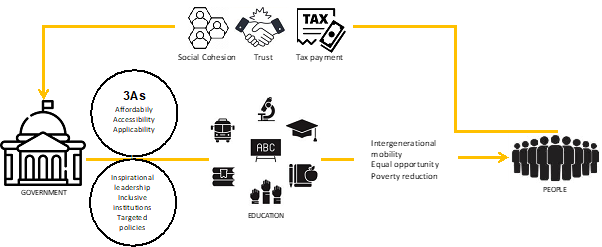by Aidi Wafa*, Akullq Edna*, Tesoriere Giuseppe* Syed Ahmed* and Saxena Sweta*
A spate of recent crises – the COVID-19 pandemic, the war in Ukraine, climate disasters and debt crisis – have reversed the developmental gains of recent decades in Africa and created millions of poor people and migrants. For social and economic stability, it is imperative to provide protection, opportunities, and social mobility to all. It is time that Governments step up their commitment to forge new social contracts to ensure equal rights and opportunities for all.
In its forthcoming 5th Session of the Committee on Social policy, Poverty and Gender themed ‘Building New Social Contracts in Africa: Choices to fulfil Developmental Aspirations’ on 2nd and 3rd November 2023, the United Nations Economic Commission for Africa (ECA) argues that new social contracts are crucial for a new discourse, and that policymakers should consider innovative ways to strengthen social policy agenda and improve the efficiency of public spending.
Indeed, years of underspending on social programs and inefficiency of public spending has taken a toll on meeting the people-related goals. At 3-4 percent of GDP, health and education spending are way below the recommended ranges by WHO and UNESCO. Additionally, inefficiency in spending has costed Africa more than US$40 billion per year in education and infrastructure and US$28 billion in health between 2000 and 2017. With socio-economic inequalities threatening the social fabric of countries, building new social contracts is needed now more than ever. How it is done will vary depending on individual country circumstances. In the Issues Paper for discussion, we use education as an entry point to tackle many other Goals. Indeed, equipped with the right knowledge and skills, people can make informed decisions, pursue healthier lives, and respond to national and global development challenges.
The Issues Paper focuses on the 3 As – affordability, accessibility, and applicability – that can influence people’s behaviours and make education policy more efficient, equitable and inclusive so that it addresses the structural barriers posed by poverty and inequality.
-
Affordable education, especially to poor populations, is critical to reduce inequality and poverty while promoting employment and inclusive development. One intervention can include cash transfers, which has been successfully adopted in Cameroon, and has shown a 30 per cent increase in the likelihood of children enrolling in school when household income is increased by 1 per cent.
-
Access to education to both urban and rural populations can enable greater social mobility, and hence a more just and equitable growth. Research focused on Nigeria, Mozambique and Ghana has found that children whose travel time to school is more than 30 minutes have poorer learning and writing outcomes. In this vein, infrastructural planning can mitigate the negative impact on children’s learning abilities.
-
Applicability of education relies on tailored education programmes in a way that improves quality, strengthens institutional credibility, and matches education to employable skills. Some African countries, like Ethiopia, have been exploring the colocation of various educational institutions in industrial and technology parks to strengthen the value chain as well as the labor and skills supply pipeline.
To prepare the labor force for the jobs of the future, it is also reasonable to ask if the current curricula are fit for purpose. Most young Africans feel that they have skill sets which do not match local labour requirements. 35 per cent of young graduates reported feeling overqualified for their jobs, while 6 per cent felt underqualified. Technical and Vocational Education and Training (TVET) can help upskill and reskill labor, which is often lacking in traditional education, and help in acquiring gainful employment. For instance, in Eswatini, 73 per cent of TVET graduates found themselves in productive employment after graduation.
How to rethink Education under a New Social contract?
There is no one-size-fits-all blueprint on how to build a new social contract through the education, but it is quite clear that a symbiotic relationship is needed between Governments and the people. Governments are responsible for ensuring that people have the requisite skills for jobs, social protection, and provision of public services. On their part, people should pay their taxes to provide their Governments with the means to deliver the services that enhance their well-being.
Such a social contract would hinge on inspirational leadership, inclusive institutions, and targeted policies. A whole-of-society approach will ensure a virtuous cycle of trust between each Government and its people, resulting in policies that deliver equal opportunities, create intergenerational mobility, and reduce poverty.
Figure IV
Examples of dynamics for the redesign of the social contract in the education sector

Source: ECA visualization of key elements, based on the present issues paper.
The authors, Aidi Wafa, Akullq Edna, Tesoriere Giuseppe, Syed Ahmed and Saxena Sweta are ECA staff working in the Gender, Poverty and Social Policy Division (GPSPD).
Issued by:
Communications Section
Economic Commission for Africa
PO Box 3001
Addis Ababa
Ethiopia
Tel: +251 11 551 5826
E-mail: eca-info@un.org

